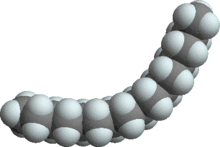Hexadecane
Hexadecane (also called cetane) is an alkane hydrocarbon with the chemical formula C16H34. Hexadecane consists of a chain of 16 carbon atoms, with three hydrogen atoms bonded to the two end carbon atoms, and two hydrogens bonded to each of the 14 other carbon atoms.
 | |
 | |
| Names | |
|---|---|
| IUPAC name
Hexadecane[1] | |
| Other names
Cetane | |
| Identifiers | |
3D model (JSmol) |
|
| 1736592 | |
| ChEBI | |
| ChEMBL | |
| ChemSpider | |
| ECHA InfoCard | 100.008.072 |
| EC Number |
|
| 103739 | |
| MeSH | n-hexadecane |
PubChem CID |
|
| UNII | |
CompTox Dashboard (EPA) |
|
| |
| |
| Properties | |
| C16H34 | |
| Molar mass | 226.448 g·mol−1 |
| Appearance | Colourless liquid |
| Odor | Gasoline-like to odorless |
| Density | 0.77 g/cm3[2] |
| Melting point | 18 °C (64 °F; 291 K)[2] |
| Boiling point | 287 °C (549 °F; 560 K)[2] |
| log P | 8.859 |
| Vapor pressure | < 0.1 mbar (20 °C) |
Henry's law constant (kH) |
43 nmol Pa−1 kg−1 |
| -187.63·10−6 cm3/mol | |
Refractive index (nD) |
1.434 |
| Thermochemistry | |
Heat capacity (C) |
499.72 J K−1 mol−1 or 2.21 J K−1 g−1 |
Std molar entropy (S |
586.18 J K−1 mol−1 |
Std enthalpy of formation (ΔfH⦵298) |
−458.3–−454.3 kJ mol−1 |
Std enthalpy of combustion (ΔcH⦵298) |
−10.7009–−10.6973 MJ mol−1 |
| Hazards | |
| GHS pictograms |  |
| GHS Signal word | Warning |
GHS hazard statements |
H315 |
| Flash point | 135 °C (275 °F; 408 K)[2] |
| 215 °C (419 °F; 488 K)[2] | |
| Related compounds | |
Related alkanes |
|
Except where otherwise noted, data are given for materials in their standard state (at 25 °C [77 °F], 100 kPa). | |
| Infobox references | |
Cetane number
Cetane is often used as a shorthand for cetane number, a measure of the combustion of diesel fuel. Cetane ignites very easily under compression; for this reason, it is assigned a cetane number of 100, and serves as a reference for other fuel mixtures.
gollark: I'm sure *you'd* like to think so.
gollark: Your proof wasn't run by our truth cuboids, so it might be wrong.
gollark: An experimental GTech™ project managed to count as high as 29 at one point. It used a significant fraction of our computational resources and some recently generated number theory.
gollark: We even count to 4 sometimes.
gollark: Can you disable SSE somehow? Would that cause that?
See also
References
- CID 11006 from PubChem
- Record in the GESTIS Substance Database of the Institute for Occupational Safety and Health
External links
- Vapor pressure and liquid density calculation
- Technique to determine hexadecane transfer
This article is issued from Wikipedia. The text is licensed under Creative Commons - Attribution - Sharealike. Additional terms may apply for the media files.